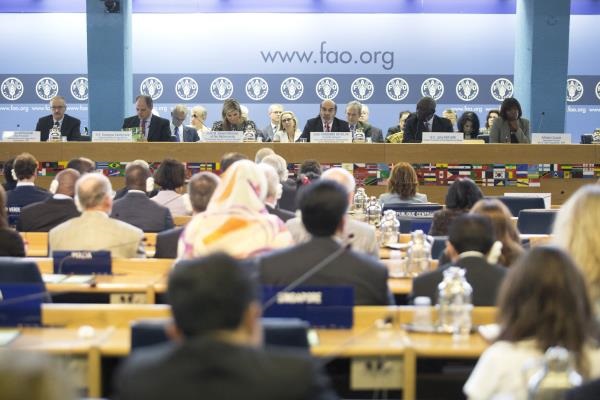
16 October 2014, Rome - While substantial progress has been made in the fight against hunger in recent years, more than 800 million people remain hungry and efforts need to be increased to reach the global target of cutting the percentage of hungry people in half by 2015, said FAO Director-General José Graziano da Silva in his opening remarks at the annual World Food Day ceremony, held at FAO Headquarters in Rome.
The estimated 500 million family farms, which make up nine out of ten farms worldwide, play a key role in scaling up food production to meet the needs of a growing world population. "At the same time, many family farmers, especially subsistence producers, are part of the 70 percent of the world's food-insecure population that lives in rural areas," said Graziano da Silva.
"Family farmers need to be protagonists of innovation. Only this way can they take ownership of the process and ensure that the solutions offered respond to their needs," he added.
In her keynote speech, Queen Máxima of the Netherlands emphasised the importance of financial inclusion as a key tool to enable farmers to protect themselves from income shocks and as a central component in any ambitious efforts to end hunger.
This includes access to savings accounts, loans and credits.
"We know through empirical evidence that when smallholder farmers are offered savings accounts, they save even more, invest more, and have higher harvest proceeds as a result," she said, adding that without the hard work of family farmers, the success story of lifting 100 million people out of chronic hunger over the last decade could not have been achieved.
Queen Máxima is the United Nations Secretary-General's Special Advocate for Financial Inclusion for Development.
John Kufuor, Former President of the Republic of Ghana emphasized the need to enhance the profitability of the family farm by helping them transform from their current subsistence production to business level operations. This, he said, would influence the resilience of communities and stimulate job creation and play a key role in reducing poverty.
"It has been established that GDP growth generated by agriculture is up to four times more effective in reducing poverty than growth generated by other sectors because the effects are on the people directly at the grassroots."
In addition to access to finance, he stressed the importance of institutional reforms in land rights, the recognition of basic rights of farmers, as well as integrated government policies on rural development in helping family farms achieve their full potential.
In his address, delivered by Archbishop Luigi Travaglino, Pope Francis underlined the need to acknowledge the increasing role of the rural family and to develop its full potential.
"This year dedicated to family farming has served to allow us to see that the rural family can respond to a lack of food without destroying the resources of creation. But we must be responsive to their needs."
The Pope stressed that, over and above the current hunger data, "Those who suffer from food insecurity and malnutrition are people and not numbers. And precisely because of their dignity as people they are above any calculation or economic project."
"Family Farming is the fulcrum on which our future food security pivots," said Executive Director of the World Food Programme (WFP) Ertharin Cousin. She highlighted that in establishing a new and sustainable vision for family farms that enhances global food supplies and protects the earth's resources, "we must address one universal problem: gender inequity."
"Ending gender inequity id not just the right thing to do, it's the smart thing to do," she said, highlighting the multitude of ways that unequal access to agricultural inputs affects women, forcing them to "work harder and longer for less."
Giuseppe Castiglione, Under-Secretary of State, Italian Ministry of Agriculture, Food and Forestry Policy, highlighted the important social function that family farming holds, including the preservation of culture, local foods and the environment.
Both Italy and Europe face the struggle of transferring farming traditions from an aging farming population to a younger generation, he said, adding that "training plays a key role in putting both innovation and tradition into the farming sector."
As the world inches closer toward the deadline for the Millennium Development Goals, Vice President of the International Fund for Agricultural Development (IFAD) Michel Mordasini called on the international community to reinvigorate its collective efforts towards the MDGs. "We still can avail of 440 days to achieve the MDG target of halving the percentage of undernourished people. To succeed, let us support more actively the world's small family farmers."
The annual World Food Day ceremony marks the creation of the United Nations Food and Agricultural Organisation on 16 October 1945.
Ahead of World Food Day, countries agreed on a series of policies aimed at ensuring that people around the world have access to healthier diets. The agreement will be adopted at the Second International Conference on Nutrition (ICN2) to be held in Rome from 19-21 November 2014. This high-level intergovernmental meeting is jointly organized by FAO and WHO.